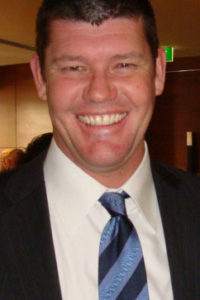On 13 October 2016, China-based employees of the Australian-owned Crown Casino woke up to the sound of police knocking on their doors. The police detained eighteen employees on suspicion of gambling-related crimes. Three of those employees, including a visiting executive, were formally arrested in November. (Authorities in China can, technically, hold suspects for thirty-seven days without formally arresting or charging them).
Gambling is illegal in China. In the past, Chinese nationals with a penchant for the game of chance frequented the casinos of Macau. But the special administrative region’s gambling industry was one of the first casualties of Xi Jinping’s anti-corruption campaign, and Macau’s economy underwent two years of severe contraction as the flow of highrollers from the mainland fizzled out.
Since then, Chinese officials have undertaken an operation called ‘break the chain’ 断链 to stop rich Chinese nationals from gambling abroad — an activity they see as connected to corruption and money laundering — and to dissuade foreign casinos from courting them. Travel agents are banned from organising trips for groups of more than ten people to foreign casinos, but the casinos have often skirted the ban by promoting general travel packages, rather than gambling-specific ones.
China’s detention of Crown Casino employees caught the world by surprise, and especially startled the management of multinational corporations dealing in or with China. Yet China has long shown a willingness to punish foreigners who don’t follow the rules, and not just in the gambling sphere. In 2014, Chinese officials arrested scores of GlaxoSmithKline employees, including a company executive for bribery within China’s pharmaceutical industry. (See also the China Story Yearbook 2014: Shared Destiny, Forum ‘A Confusing Year for Business’) Cases like this fall under an age-old Chinese strategy of making an example of a single transgressor to dissuade others from similar behaviour, or ‘killing the chicken to scare the monkey’ 杀鸡儆猴. After GlaxoSmithKline’s predicament, other international pharmaceutical companies made sure to clean up their act.
In the case of Crown Casino, the company had failed to heed warnings from officials that courting Chinese high rollers would not be tolerated. In June 2015, Chinese police arrested thirteen South Korean casino managers for ‘enticing’ Chinese nationals to gamble in their casino with free tours, accommodation, and even sexual services. While there’s no indication that Crown Casino used similar tactics, Chinese police were evidently unhappy with the company’s lack of response to its warning.
Crown Casino’s share prices tumbled twenty percent in response to the arrests, wiping out AU$1 billion from the company’s market value. In a previous company report, CEO James Packer had reported that the clampdown on gambling in Macau had been good for business, as it sparked an influx of Chinese high-rollers to Australia. High rollers account for a third of Crown’s revenue, and a majority of Crown’s top players are from China. While it’s unclear why the authorities singled out Crown Casino, as opposed to any other foreign casino marketing itself in China, rumours circulated in international media that Crown had adopted an especially aggressive approach to courting potential clients.
At the time of writing, no Crown Casino employee had been formally charged, and the fate of many detained employees is still unclear.
Notes
David Barboza, ‘Drug giant faced a reckoning as China took aim at bribery’, The New York Times, 1 November 2016, online at: http://www.nytimes.com/2016/11/02/business/international/china-rules-glaxo-bribes-sex-tape-whistleblower-cautionary-tale.html
Elizabeth Knight, ‘Why James Packer’s casino wounds have been re-opened’, The Sydney Morning Herald, 24 November 2016, online at: http://www.smh.com.au/business/world-business/why-james-packers-casino-wounds-have-been-reopened-20161123-gsvp61.html
Javier C. Hernandez and Michelle Innis, ‘China’s crackdown on Crown Resorts shakes casino industry’, The New York Times, 18 October 2016, online at: http://www.nytimes.com/2016/10/19/business/international/crown-resorts-casinos-australia-china.html





